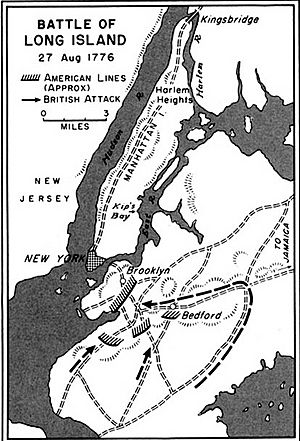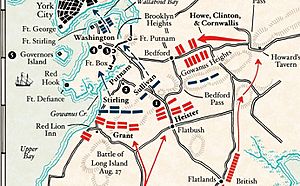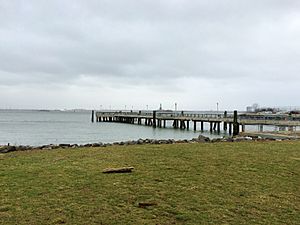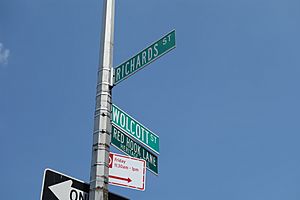Red Hook Lane Arresick facts for kids
Red Hook Lane Arresick is a special burial ground in Red Hook, Brooklyn, important because of the American Revolutionary War. During the big fight known as the Battle of Long Island, American soldiers were retreating. They were led by General Stirling. These soldiers fought a brave "rearguard action" to protect their friends.
Some American riflemen were escaping from a place called Fort Defiance. They fired at British soldiers who were coming through Gowanus. This area was once an old Canarsie Indian path. During this fight, a British Lieutenant Colonel and his helper were killed. The Pennsylvanian rifleman who shot them also died. All of them are believed to be buried together near this path, which later became known as Red Hook Lane.
What Was Fort Defiance?
Long ago, the area around Fort Defiance was a marshy island with cypress trees. When the Dutch arrived in 1630, they called it Roode Hoek, meaning "Red Hook." This name came from the red clay found nearby. The Dutch were good at filling in swampy land. This helped make the peninsula solid enough for heavy cannons. The land was also 40-50 feet high, which gave the American colonists a good view and advantage.
Today, Fort Defiance is not clearly marked. There is a small historical sign at the end of Coffey Street pier. This is about two blocks from where the fort actually stood, near Van Dyke Street and Conover Street. The fort was destroyed during the battle by bombs from a British ship called the H.M.S. Roebuck. The only way to get to the fort was an old Indian trail called Red Hook Lane. This path led to Brooklyn Heights. The last part of this old road disappeared from maps around 2020.
The Death of a British Officer
A British officer, Lieutenant Colonel James Grant, was leading his troops. They were trying to go around the American army's right side after a battle at Battle Hill. The Colonel chased the Americans through marshy land and across Gowanus Creek. A Pennsylvanian rifleman, hiding in a tree, shot him and his helper.
The British soldiers fired back, and the American rifleman, often called a minuteman, was killed. The British army stopped to bury the Colonel and his helper near Red Hook Lane. They then continued their advance towards George Washington's army in Brooklyn Heights. They left the American soldier where he fell. Later, people who supported the American cause buried the minuteman in the same spot.
The Americans were very happy when they heard about the death of "Colonel Grant." They mistakenly thought it was the well-known British leader, Major-General Grant, who had led an attack from Gravesend. The rifleman was buried inside a hollow tree trunk that had been struck by lightning.
Most of the New York City area was controlled by the British army from late 1776 until November 23, 1783. That's when they finally left the city.
John Burkard, a historian who grew up in Red Hook, spent many years researching the history of Roode Hoek. He found old maps from 1766 that showed an even older fort on the island from the 1600s. He believed that a strangely shaped building at Columbia and Nelson streets was the location of the burial ground. This building, built in 1932, had one corner cut off and left empty. Local stories say this empty corner is the "arresick" (a Dutch word for burial ground) of Lieutenant Colonel Grant and the two soldiers.
John Burkard wanted a special "heritage trail" through Red Hook. This trail would go from the burial ground to Fort Defiance. In 2007, street signs were put up on Coffey Street, Conover Street, Walcott Street, Dwight Street, and Columbia Street. These signs mark the Red Hook Lane heritage trail, which starts across from the burial ground and follows the old path back to Fort Defiance.
What Does "Arresick" Mean?
The word Arresick comes from the Dutch language. It means "burial ground."
|
 | May Edward Chinn |
 | Rebecca Cole |
 | Alexa Canady |
 | Dorothy Lavinia Brown |





